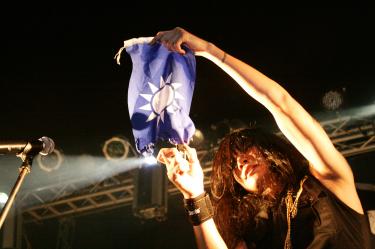More than 1,000 people from across Taiwan and overseas rocked the sleepy town of Puli (埔里) in the mountains of Nantou County on Saturday night for the first heavy metal concert to be held at one of the nation’s temples.
A little after sunset, music accompanied by waves of loud shouting could be heard coming from the parking lot of the Sing-ling Temple. Unlike the traditional music one normally hears at a temple during religious festivities, this was the sound of the bass, electric guitar and keyboards, and the shouting did not come from the faithful, but from fans of the local heavy metal band Chthonic.
According to many, this was the first heavy metal concert to be staged at a temple in Taiwan.
In addition to Taiwanese, -concert-goers came from Japan, Hong Kong, Singapore, the US, France, Spain and Germany.
“It has always been my dream to hold a concert at Sing-ling Temple,” Chthonic lead vocalist Freddy Lim (林昶佐) told the crowd during the performance. “Someone asked: ‘Why not have the concert at Long-shan Temple?’ Well, the significance is quite different.”
“This is the place where a band of Taiwanese fiercely fought their last battle against Chinese Nationalist Party [KMT] troops after the 228 Incident more than 60 years ago, and we should always remember their courage and bravery,” Lim said to loud applause and cheers.
Lim was referring to an island-wide uprising against the KMT regime that broke out on Feb. 28, 1947, demanding political rights, freedom and autonomy for Taiwanese.
Although the people had the upper hand in the initial phase, they met with a violent crackdown by KMT troops. People then formed guerrilla groups to continue their resistance from their hideouts in the mountains in central Taiwan.
As many as 20,000 people are believed to have been killed or imprisoned during this time.
Several events that took place at Sing-ling Temple have been recounted in the band’s two latest albums, Mirror of Retribution and Takasago Army, giving the concert special significance.
“I’ve never been to a heavy metal concert in a temple, this is very special,” said Ryan Hsieh, a fan from Hsinchu. “But Chthonic didn’t choose this special location for the sake of being special, the band has chosen the place because of what it signifies.”
Damien Caillou, a Frenchman who has lived and worked in Taipei for two years, also enjoyed the concert, saying it was a “unique experience.”
“I was a fan of Chthonic even before I came to Taiwan, but the band never went to France,” Caillou said. “I’m so happy to see them here, at such a special place.”
“This is simply too cool,” a fan from Greater Kaohsiung who wished to be known only as “Latte Lee” said. “I wonder why a temple would lend the place to some crazy metal fans doing crazy things like throwing ghost money around?”
It has been a tradition for fans to throw ghost money during Chthonic concerts since a lot of the band’s lyrics recount Taiwanese folk stories about the spiritual world and fans gave the lead vocalist the nickname “King of Ghosts.”
The Taipei Times took the question to Sing-ling Temple chairman Chang Shen-er (張伸二).
“When we first heard someone wanted to hold a concert at the temple, we though music is always good, it calms people’s hearts,” Chang said before the concert. “But we learned this wasn’t the kind of music we thought it was after seeing media reports about Chthonic.”
Although heavy metal is something new for the temple, its board of directors thought it was worth a try, Chang said.
Still, the decision was only settled after the deities in the temple agreed to it.
“After the board of directors discussed my proposal to let the place be used for the concert, the chairman said they still needed to ask the deities at the temple,” Lim said after the concert. “So they threw the divine blocks to ask the deities, and the deities said ‘yes’ right away.”
The divine blocks are pairs of cresent-shaped wooden blocks used by Buddhists and Taoists to ask the deities their opinion. If one block faces up while the other faces down when thrown to the ground, it means “yes.”
Source: Taipei Times - 2011/10/24





















